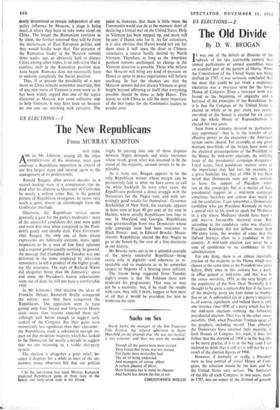The New Republicans
US ELECTIONS —1
From MURRAY KEMPTON
NEW YORK
AND so Mr Johnson, among all the other complications of his existence, must now confront a Republican opposition in control of our five largest states and secured again to the management of its professionals.
Ronald Reagan, after several decades as a second leading man, is a conspicuous star in- deed after his election as Governor of California by nearly a million votes. But, in the general pattern of Republican resurgence, he seems very much a sport, almost an afterthought from the Goldwater interlude.
Otherwise, the Republican revival seems generally a gain for the party's moderates: most of the successful candidates this year were quiet and even dim men when compared to the Presi- dent's gaudy and splashy style. Even Governor- elect Reagan, the only one of them whose expressions are habitually extreme, seems upon inspection to be a man of few fixed opinions and a manner professionally soothing. In general, the message that triumphed on Tuesday was one delivered in the tones employed by television announcers to sell a product of the higher grade, say life insurance. The style of Richard Nixon did altogether better than Mr Johnson's: more and more the President's hoarse exhortations seem out of date; he will not have a comfortable 1968.
In Mr Johnson's 1964 election the ideas of Franklin Delano Roosevelt finally conquered the nation : now they have conquered the Republicans. The opposition seem to have gained only four Senate and forty-seven House seats—more than anyone expected them to,* although well below enough to suggest early control of the Congress. But their gains were numerically less significant than their character: the Republicans made a substantial enough im- pact on that moderate majority which has looked to the Democrats for nearly a decade to suggest that we are returning to a viable two-party system.
The election is altogether a great relief, be- cause it disposes for a while at least of the un- easiness many observers felt that our politics
* In the SPECTATOR last week Murray Kempton predicted Republican gains of three seats in the Senate and forty-seven seats in the House.
might be passing into one of those disputes between Negro demands and white resistance whose result, given what was assumed to be the mood of the majority, seemed certain to be de- plorable.
As it turns out, Reagan appears to be the only Republican winner whose margin can be persuasively laid to what we have come to call the white backlash. In most other cases, the Republicans preferred a direct struggle with the Democrats for the Negro vote, and with sur- prisingly good results for themselves : Governor Rockefeller of New York, for example, appears to have won at least 40 per cent of the vote in Harlem, where usually Republicans lose four to one. In Maryland and Georgia, Republicans won governorships from two Democrats whose only campaign issue had been resistance to Black Power: and, in Edward Brooke, Massa- chusetts Republicans elected the first Negro to go to the Senate by the vote of a free electorate in our history.
Mr Brooke turns out to be a splendid example of the newly successful Republican—being exotic only in pigment—and otherwise so re- spectable and so moderate as to be somewhat suspect to Negroes of a bearing more militant.
The lesson being suggested from Tuesday night's events is that Mr Johnson must now moderate his programmes. That may or may not be a necessity: but, if he reads the results with care, they will, I think, suggest to him most of all that it would be provident for him to moderate his style.






































 Previous page
Previous page